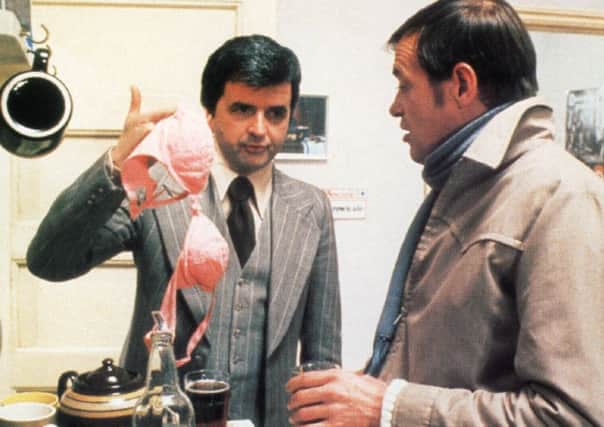Aidan Smith: How lack of choice on TV helped '˜adultise' a generation


The day Rodney Bewes died the results of a poll to find Britain’s “best-loved” sitcom were announced. Only Fools and Horses won it, Fawlty Towers was second and Blackadder third – but Bewes’ Likely Lads was nowhere and didn’t even make the top 20.
Possibly Bewes from beyond the grave would think that just typical. He didn’t have much luck after his show ended, turning up at the BBC to hustle for work on a bicycle rather than the Bentley he drove at the height of his fame, and was reduced to taking a job as spokesman for the British Onion Marketing Board. There was an almighty fall-out with his co-star James Bolam who vetoed re-runs, depriving Bewes of repeat fees and doubtless some votes in that poll.
Advertisement
Hide AdAdvertisement
Hide AdBecause The Likely Lads isn’t shown on the golden oldie channels it’s possibly slipped from the collective memory, though I don’t know why because it was brilliant. If you were a child of the 1960s or 1970s you watched pretty much everything on TV. There wasn’t a lot – only two channels, later three – and not very much was tailored for children. So you watched what your parents watched.
Did this do me any harm? I went onto YouTube after the sad news about Rodders and revved up some classic episodes. One of them had Terry, played by Bolam, taking the names of Malcolm Muggeridge and Lord Longford in vain. This reminded me that I knew who these guys were when I was the same age as my son now.
READ MORE:
The kind of TV I watched – had to watch – could bore, alarm, confuse and cause you to blush with embarrassment, and I’d have to blame my pink cheeks on the three-bar electric fire. But it was also educational. You learned stuff.
I wasn’t a swotty child like the annoying know-it-alls with the plastered-down hair on the quiz show Ask the Family, but at least I knew what “intellectual” meant because the word turned up in the theme tune for one of the few aimed-at-kids programmes, Top Cat, and I looked it up in a dictionary.
Who uses dictionaries anymore? Would my own children know the names of the modern equivalents of Muggeridge and Longford, the pre-eminent fun-reduction officers of today? No, and that may be partly my fault as a parent, but I stand, helpless and appalled, in the face of a teenybop televisual tsunami. Kids have more than enough shows of their own now; they no longer have to watch Civilisation, a 13-part history of art and philosophy presented by an unsmiling man in fearsomely stout tweeds.
In this infantilised age, everyone on TV tries to look younger than they are. Regardless of whether they work for the vast empire of dedicated children’s programming, they’ll be sporting skinny jeans and wacky hair. What is the opposite of infantilised? My generation was adultised. Maybe the term doesn’t exist but it could still have turned up on Call My Bluff, the word-based panel game which made absolutely no concessions to kids but which we watched anyway.
As well as Call My Bluff and Civilisation, we tuned into Man Alive and Horizon, shows for adults with adult concerns. We watched those debates with Muggeridge and Longford which positively groaned with TC’s intellectualism. Bernard Levin was another highbrow fixture of the time – not to be confused with Bernie Winters, Mike’s goofy brother.
READ MORE:
We watched Alan Whicker’s programmes because he would march right into strange lands and tense situations. Even though we weren’t entirely sure what was going on, the questions he asked could result in a sore face or a great revelation, and we loved the drama. He wore cravats and bow-ties and never once “got down with the kids”.
Advertisement
Hide AdAdvertisement
Hide AdUnder the heading of actual drama we watched series about incest (Bouquet of Barbed Wire), mid-life crises (Telford’s Change) and of course Play for Today where every other week the premise was an attractive, carefree Swedish au pair turning up at a house in a respectable street with her fondue set. Or so it seemed to this boy-man.
The other day I asked my youngest daughter what she wanted to be when she grew up. “Boss of my own nail bar,” she beamed, the inspiration for this coming from her favourite show, the interminable, screeching Barbie: Life in the Dreamhouse. I don’t think Joyce Grenfell, a regular on Face the Music, the classical quiz, would approve of the career-choice. What’s wrong with astronaut or barmaid at the Fat Ox pub?
That was the local of Likely Lads Bob and Terry. Sitcoms were the most accessible programmes to my generation because we were invited to laugh at adults doing silly things, but writers Dick Clement and Ian La Frenais went further than that, crafting a lovely, subtle study of friendship and class.
On grown-up TV, Bob and Terry were the least grown-up. They burst into living-rooms – right after the cocky young heroes of cinema’s kitchen-sink dramas, such as Saturday Night and Sunday Morning, and A Kind of Loving – and, just as Ringo Starr was poking a drumstick into Harold Wilson’s pipe, extinguished deference.
Just as social revolution ignited, the chums went off air. When they returned, they’d grown up, or at least Bob had. Got himself a house and a wife and a Vauxhall Viva. Terry came out of the Army to discover he’d missed some excitement: “Swinging Britain, the death of censorship, the new morality, Oh Calcutta!, topless waitresses, see-thru knickers.” The sequel was even funnier, and sadder, than the original.
So that’s why, from now until Christmas and finishing with the 1974 festive special’s wife-swapping party, my kids are going to watch an episode of The Likely Lads every night before bed.